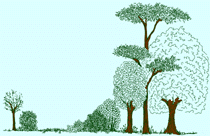 |
What did you do in the great genetic engineering wars? | |
|
When I get around to writing my semi-autobiographical novel (provisional title - Green Is Just A Colour) I will devote a whole chapter to the heroic role I played in the Great Genetic Engineering War (GGEW). The chapter will be filled with passion and emotion, with righteous indignation, and will have an impressive array of saints and sinners. It might be the definitive account since I already feel that I have been at the epicentre of the GGEW and have suffered much from its fallout. The chapter could go something like this: The young man slightly bent his back while he gently pushed the hoe through the rich, fertile soil down by the river. I could'nt help but notice that his mind was not on his work. 'What was it like' he asked. 'How did you survive that time? What did you do in the GGEW?' Feeling freer to talk than in many years, I started at what was my beginning - the years of learning, the understanding that logic would give me explanation, and that discipline in thought would be repaid. I could see he was confused as these were unfamiliar concepts. It had only been very recently that it was safe to embrace them again. 'Didn't any of you think it was wrong to tamper with the unknown?' His question hung in the air as I searched through my emotions. During the GGEW, this had been the battle cry of the Eco-warriors and its absolutism had been painful. Now, as the years flowed into each other, I realised that, at last, these words no longer caused me to shudder. 'It was exhilarating' I exclaimed. 'We were discovering how things worked together, and we foresaw how much closer we could come to harnessing nature's benefits. We realised that nature needed understanding rather than blindly raising on a pedestal'. He stirred at this. 'But weren't people told that it was doing more harm than good?' My head dropped. In a sense, he was right. The early developments were unsatisfactory and many of us argued for clearer goals to be set. We knew there were better things on the way, but the GGEW overtook events. I tried to explain. 'You have to understand that it was a very confused time. Logic seemed to fall by the wayside while the Eco-warriors bent anything to their cause. We passed around information, we tried to explain the facts, but our utterances became increasingly hopeless, drowned out by the loudest voices of that time'. I was eventually taken in the night. 'Were you interrogated?' he asked. I could not meet his eyes for, in foolish pride at what I had believed in, I had revealed the names of my co-workers. I remember, many years later, when we chanced to meet during our dispersal, that those friends and colleagues could not find it in themselves to condemn me. The young man had known that I had been interned, and as I carefully shifted position I could see his concern at my frailty. Those years had been hard and someone so young did not need to share in those memories. The relentless and unremitting re-education, the forced hard labour of tearing down laboratory after laboratory, dismantling any vestige of science. It had been the final triumph of the Eco-warriors. That their anarchy could become law surprised many, but it was the outlawing of science and the imprisonment of researchers that finally caused the disquiet to grow. 'Time moves on' I sighed, hoping that he would not press me further. The famines that followed were the epitaph for the GGEW. The young man was born during those times and, if he had been able to recall, he would have witnessed the pestilence and disease that spread throughout the country, devastating its food production. Its causes had been simple: the Eco-warriors, lacking any experience of food production, had laid down prescriptive rules about how food should be produced. There was compulsory certification and the inspection system had been punitive with only slight deviations bringing down wrath and penalties. It had been the inability of the food producers to be able to have flexibility, to use their local knowledge, to work things out for themselves that allowed the natural world to exact its toll. We had talked about this often before, since the stench of rotting food was his one faint memory of early childhood. As freedom gradually came back and common sense re-evolved, the disaster was finally turned around. Each day, as he worked the land, we would talk about how nature fitted together, how so many things happened without us even seeing them. Here was a bond that spanned the years between us. While I was in the twilight of my life, I could see in this young man the inquiring mind that had so characterised my early years. He would look into the unknown future and not be afraid of it. Mark Fisher (who apologises for having a doctorate in biochemistry) 25 April 1999 www.self-willed-land.org.uk mark.fisher@self-willed-land.org.uk |